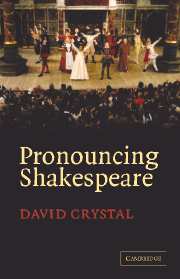Summary
This has been a curious book to write – an unusual blend of biography, narrative, and academic content. It reflects the unusual nature of the experience. It cannot be often that academic linguists find themselves so intimately involved in the theatre world, or for theatre practitioners to be so heavily involved with historical linguistics. But the integration of the two domains is exciting, in whichever direction one travels.
The person who made this journey first, in living memory, was John Barton, who approached it from the opposite direction. If this book were being dedicated to any one person, it would have to be him, for his production of a Shakespeare play in Elizabethan pronunciation took place in 1952, when I was eleven and had yet to see my first Shakespeare play (Paul Robeson's Othello, seven years later – in which, incidentally, Sam Wanamaker played Iago).
When I met Barton, while preparing this book, his first words to me were: ‘You are a lucky fellow.’ I knew it. In my non-linguistic life I have had a lifetime amateur or semi-professional relationship with the theatre. I have acted in several repertory companies, as has my wife, directed a few times, and toured my own shows. We have a son who became a professional actor. For years we have spent an annual holiday in Stratford.
Information
- Type
- Chapter
- Information
- Pronouncing ShakespeareThe Globe Experiment, pp. xi - xivPublisher: Cambridge University PressPrint publication year: 2005
